


Gut Health
J J 26 Jan 2021
Improve your Gut Health with LactoSpore®
Share
Probiotics are the live bacteria that live in your digestive tract, they are often referred to as “good” bacteria. They are helpful because of their overall supportive role in restoring the balance of the gut microbiome, by assisting with functions such as nutrient absorption, healing of digestive issues, supporting overall brain health, and helping fight certain allergic conditions and infections. [5]
Bacillus Coagulans is a type of probiotic or “good” bacteria. It’s able to generate spores during its reproductive lifestyle which gives it the ability to go dormant during harsh conditions and an advantage over other probiotics. B. Coagulans can be found in many natural food sources such as sauerkraut, kimchi and yoghurt but are also available in supplement form. [4]
There have been many studies on the benefits and uses of B. Coagulans some include:
- Irritable Bowel Syndrome (IBS)
- Rheumatoid arthritis
- Constipation
- Intestinal gas
- Respiratory tract infection
LactoSpore ® by Sabinsa:
Lactospore ® is a product by Sabinsa that contains lactic acid producing microbial preparation from Bacillus coagulans, MTCC 5456 (earlier known to be Lactobacillus sporogenes)
Benefits of LactoSpore ®:
- Due to its spore forming nature, LactoSpore ® survives manufacturing, shipping and storage with no loss of viable count
- Does not require refrigeration conditions
- Is room temperature stable
- Cardiovascular support
- Can help with Gastrointestinal Health
- Clinical studies have revealed that it can be successfully implanted in the intestine
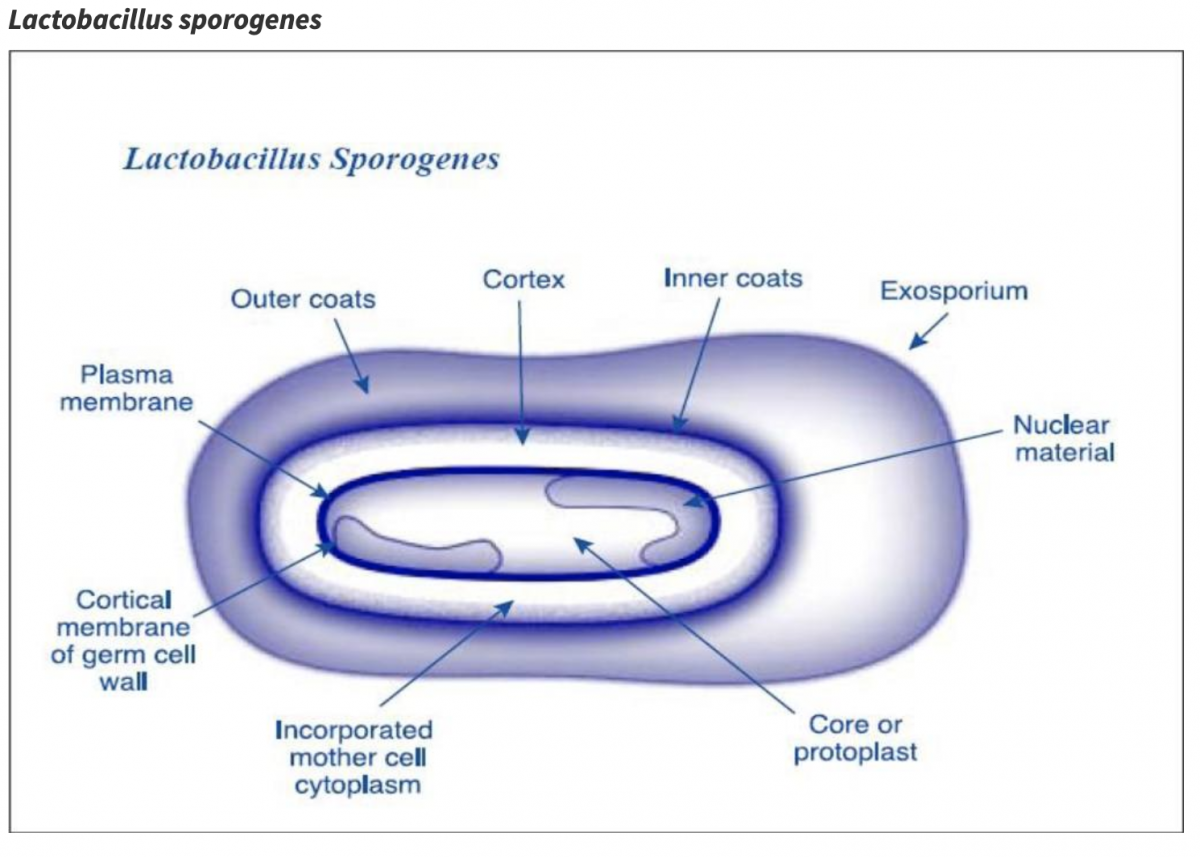
Our digestive tract contains approximately 400 different bacteria species that reduce growth of harmful bacteria and promote a healthy digestive system. Lactic acid producing bacteria are the largest inhabitant in our system. LactoSpore ® produces L(+) lactic acid, grows in the temperature range 35C to 50C and the optimum pH range is 5.5-6.5.
Everything we do affects our microbial population in our gastrointestinal tract, from our food-consumption patterns, exposure to environmental pollutants, extensive travel and unexpected changes in weather. Some health conditions such as eczema and food allergies can also throw off the balance of intestinal bacteria. If a person was to experience all of these changes in their life at once, the harmful bacteria may become predominant – a condition called bacterial overgrowth. Bacterial overgrowth can create an imbalance which may cause problems such as inefficient digestion, diarrhoea, constipation and flatulence to severe gastro-intestinal disorders.
Sabinsa’s LactoSpore ® is one probiotic supplement that may help restore and maintain your overall health and balance the gut’s microbiota population.
The species of Lactobacillus called Bacillus coagulans forms spores, which on activation in the acidic environment of the stomach, can germinate and proliferate in the intestine and produce lactic acid to then effectively prevent the growth of pathogens.
Studies on LactoSpore ®
Gastrointestinal Health
Symptoms were improved due to abnormalities in intestinal flora, a total of 567 cases in Japan were evaluated:
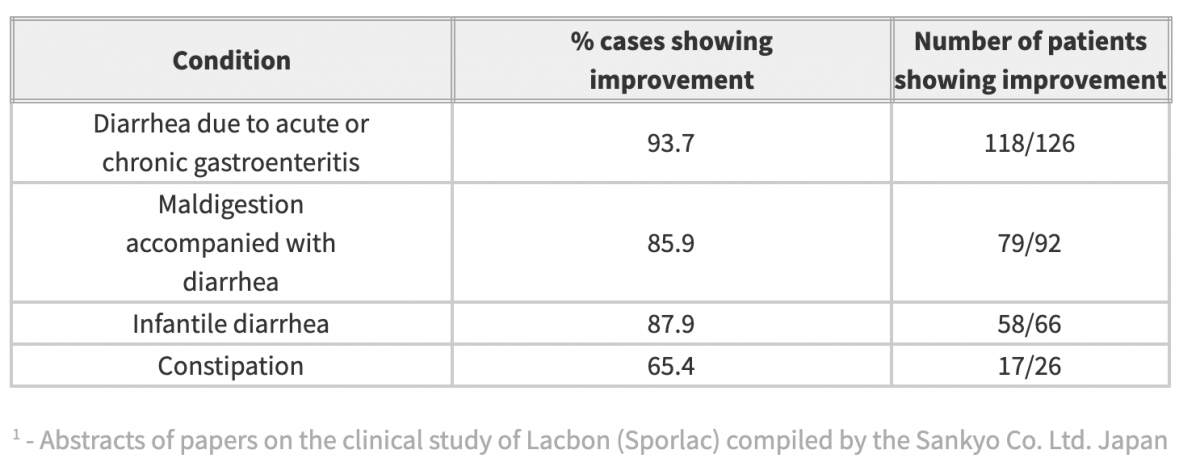
Study 1: gastrointestinal health: studies in india
A study on 60 neonatal diarrhoea cases were evaluated and responded well to L. sporogenes therapy. A dose of 15 million spores per day was administered and patients had a recovery period of 1.8 days.

Gut Health and Disease Prevention
There are several health benefits known to be associated with probiotic consumption, they include: protection against diarrheal diseases, nosocomial and respiratory tract infections, cholesterol lowering effects, attenuation of overt immune-inflammatory disorders and anti-cancer activities.
Objective:
To evaluate the safety and efficacy of Bacillus Coagulans MTCC 5856 (LactoSpore ® ), as a dietary supplement, in patients receiving care of treatment for diarrhoea- predominant irritable bowel syndrome.
Method:
Thirty six newly diagnosed diarrhea predominant IBS patients were enrolled in three clinical centres. Along with standard care of treatment, 18 patients in group one received placebo while in group two 18 patients received B. coagulans MTCC 5856 tablet containing 2 × 109 cfu/day as active for 90 days. Clinical symptoms of IBS were considered as primary endpoint measures and were evaluated through questionnaires. The visual analog scale (VAS) was used for abdominal pain. Physician’s global assessment and IBS quality of life were considered as secondary efficacy measures and were monitored through questionnaires.
Results:
There was a significant reduction in bloating, vomiting, diarrhea, abdominal pain and stool frequency in the patient group receiving B. coagulans MTCC 5856 when compared to the placebo group. Similarly, disease severity also decreased and the quality of life increased in the patient group receiving B. coagulans MTCC 5856. B. coagulans MTCC 5856 could be a potential agent in the management of diarrhea predominant IBS patients. [2]
Depression associated with irritable bowel syndrome
Objective:
To assess the safety and efficacy of the probiotic strain Bacillus coagulans MTCC 5856 for major depressive disorder (MDD) in irritable bowel syndrome (IBS) patients.
Method:
The study was randomised, double blind, placebo controlled, multi-centre pilot clinical study in irritable bowel syndrome subjects suffering from severe depression symptoms. Patients were randomised to receive either B. coagulans MTCC 5856 for 90 days or placebo.
Results:
Supplementation of the B. coagulans MTCC 5856 resulted in significant favourable change in rating scales for depression and irritable bowel syndrome compared to the placebo group. All the safety parameters remained well within the normal clinical range and had no clinically significant difference between the screening at the end of the study. B. coagulans MTCC 5866 showed robust efficacy for the treatment of patients experiencing IBS symptoms with major depressive disorder. These findings support B. coagulans MTCC 5856 as an important new treatment option for major depressive disorder in IBS patients. [3]
Obesity
Several systematic reviews have suggested that metabolic risk factors can be reduced by adapting dietary modifications, such as low-carbohydrate foods or low-fat diets.
Study Objective:
To evaluate changes in anthropometric measurements, body composition, blood pressure, lipid profile and testosterone following a low energy-density dietary intervention plus regimented supplementation program, including intake of LactoSpore ® tablets.
Method:
This study was a pre-post intervention design without a control group. Normal participants were recruited from the faculty, staff, students and community members from a chiropractic college to participate in a 21-day weight loss program. All participants received freshly prepared mostly vegan meals that included 1200 to 1400 calories per day for the women and 1600 to 1800 for the men.
The regimented supplementation program was divided into 3 weekly phases: Reclaim, Release and Restore. Nutritional supplements containing enzymes that were intended to facilitate digestion, reduce cholesterol levels, increase metabolic rate, and mediate inflammatory processes were consumed 30 minutes before each meal. The regimented supplementation program included once-daily supplementation with a green drink that contained alfalfa, wheatgrass, apple cider vinegar, and fulvic acid throughout the study period. A cleanse supplementation containing magnesium, chia, flaxseed, lemon, camu camu, cat’s claw, bentonite clay, turmeric, pau d’arco, chanca piedra, stevia, zeolite clay, slippery elm, garlic, ginger, peppermint, aloe, citrus bioflavonoids, and fulvic acid was added before each meal during week 2. During week 3, the cleanse supplementation was replaced with probiotic and prebiotic supplementation.
Conclusion:
At the end of the study the data suggested a clinically significant pre-post intervention decrease in body weight, BMI, waist circumference, hip circumference and waist to hip ratio. Pre-post intervention decrease in levels of total cholesterol, LDL cholesterol and triglycerides was also observed. A significant change in fat mass and fat-free mass was witnessed during the pre-post intervention program.
The observational study indicates that a low calorie-density dietary intervention plus regimented supplementation along with patient education improved weight status and lipid profiles. [1]
References:
[1] – https://lactospore.com/wp-content/uploads/pdf/LactoSpore-Research2013.pdf
[2] – https://lactospore.com/wp-content/uploads/2016/07/Clinical.pdf
[3] – https://lactospore.com/research/clinical#clinical-2018
[4] – https://www.healthline.com/health/bacillus-coagulans
[5] – https://lactospore.com/about-lactospore/what-is-lactospore
[6] – https://sabinsa.com/products-from-sabinsa/130-lactospore
CYOS blog content is for informational and educational purposes only, and should not be considered medical advice, diagnosis or treatment recommendations. Always consult with your doctor or medical professional before using any dietary supplements or if you suspect you have any medical concerns or issues.
Share
SHOP OUR PRE-MADE CAPSULES RANGE
100% Pure • Encapsulated in Australia • Vegetarian Capsules • No Fillers • No Additives • No Binders • No Anti Caking Agents • Allergen Free • No Preservatives • Non GMO
Our best sellers
 Search Products
Search Products
 All Products A-Z
All Products A-Z
 Pre-Made Capsules
Pre-Made Capsules
 Additives
Additives
 Amino Acids
Amino Acids
 Anti-Oxidants
Anti-Oxidants
 Beauty
Beauty
 Bioactive Compounds
Bioactive Compounds
 Bulk Items
Bulk Items
 Empty Capsules
Empty Capsules
 Fats & Oils
Fats & Oils
 Fibers
Fibers
 Herbal Extracts
Herbal Extracts
 Joints
Joints

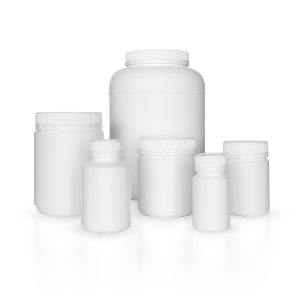
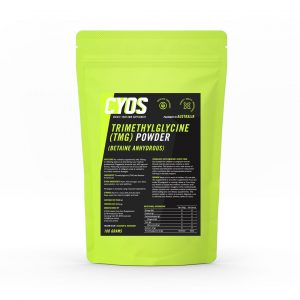
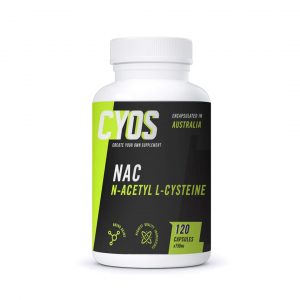


 Mushroom Extracts
Mushroom Extracts Nootropics
Nootropics Packaging
Packaging Probiotics & Digestion
Probiotics & Digestion Proteins
Proteins Sleep
Sleep Stimulants
Stimulants Super Blends
Super Blends Super Foods
Super Foods Tools
Tools Vitamins & Minerals
Vitamins & Minerals Weight
Weight Workout
Workout